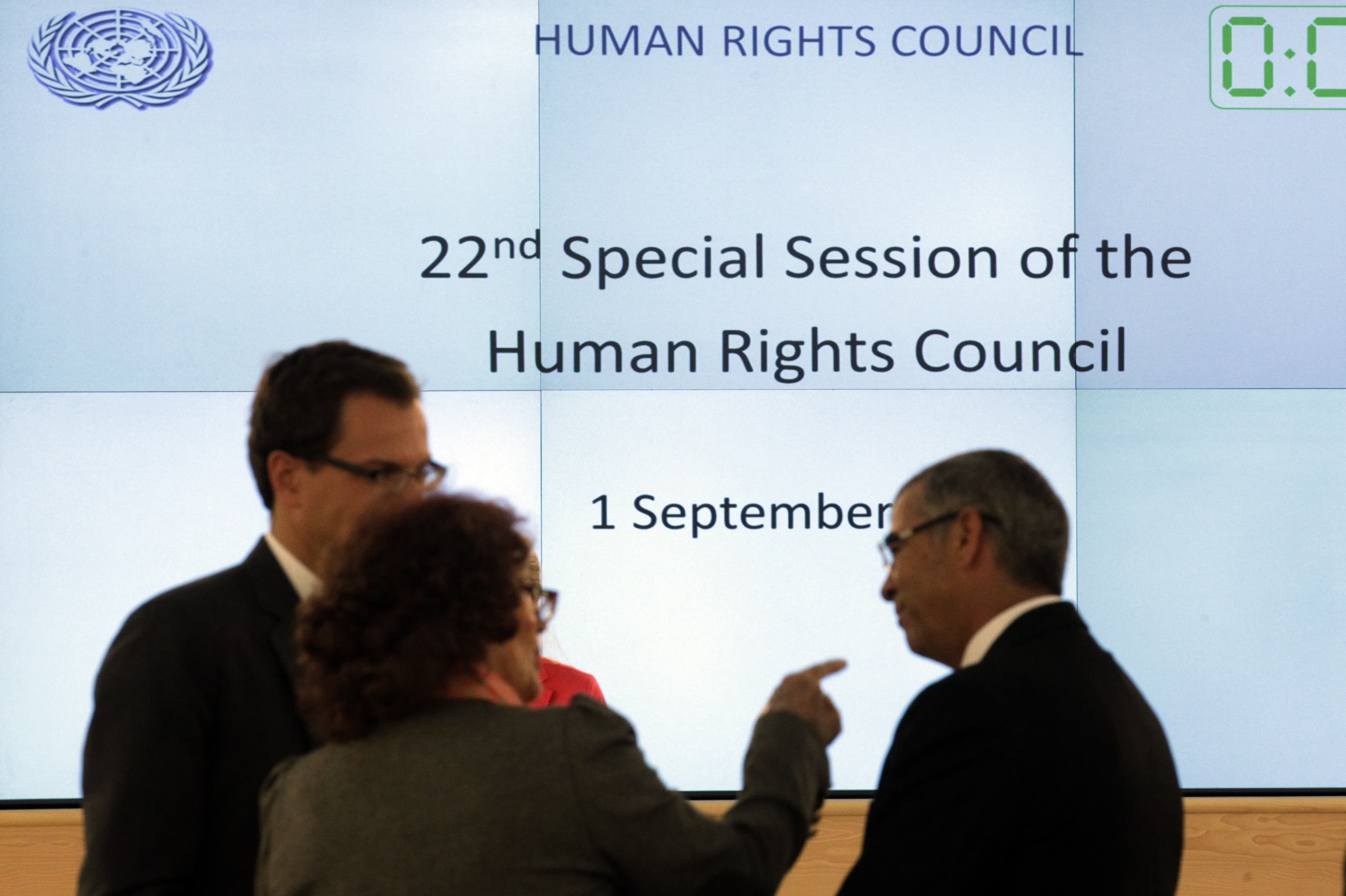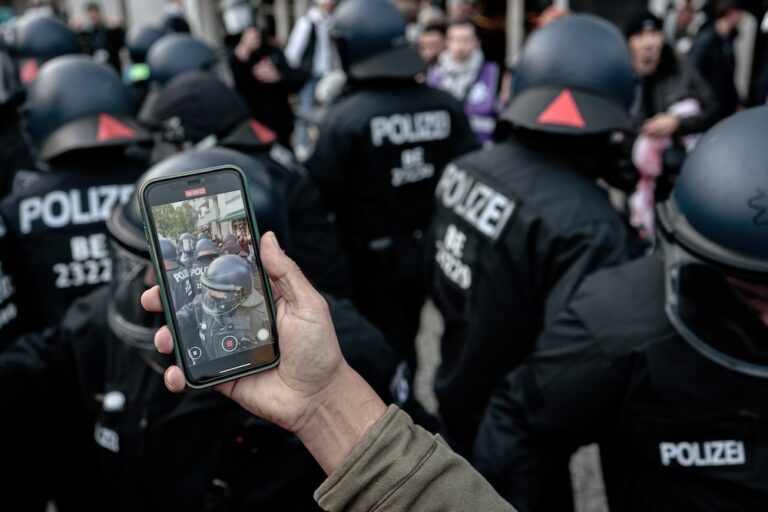For three weeks this September, the UN Human Rights Council will meet in Geneva to act on some of the most pressing human rights challenges facing the world today. Free speech is central to the Council's packed agenda.
For three weeks this September, the UN Human Rights Council will meet in Geneva to act on some of the most pressing human rights challenges facing the world today. Free speech is central to the Council’s packed agenda, in which the following topics are up for discussion:
• ending impunity for attacks on journalists
• protecting civil society space
• privacy and surveillance in the digital age
• the rights of LGBTI people
• the universality of human rights
• increasing public participation in decision-making.
Before the newly appointed UN High Commissioner on Human Rights, Prince Zeid Ra’ad Zeid al-Hussein, opens the 27th Session of the Human Rights Council on Monday, here is a quick round-up of what is at stake and where ARTICLE 19 will be demanding action from States.
You can follow @article19un for live updates from Geneva, watch the Session live, and use #HRC27 to join the discussion.
ENDING IMPUNITY FOR ATTACKS ON JOURNALISTS
Impunity for attacks on journalists is the focus of a resolution on the safety of journalists which Austria, Brazil, France, Greece, Morocco, Qatar and Tunisia will be tabling at the September Session.
The resolution will follow the Office of the High Commissioner for Human Rights (OHCHR)’s presentation of their report on a panel discussion on the safety of journalists that took place in June. This report highlights impunity as “the greatest obstacle to ensuring effectively the safety of journalists”.
The resolution is timely. Nine out of 10 murders of journalists have gone unpunished in the last 10 years – and there have been more than 500 of them. This week, international rapporteurs on freedom of expression have urged for stronger protection of journalists covering conflicts, particularly in the light of recent attacks on the media in Syria, Ukraine, Iraq and Gaza.
Only a few weeks after the 27th Session, on 2 November 2014, the UN will mark the first International Day to End Impunity for Crimes Against Journalists (following the adoption of Resolution 68/163 by the UN General Assembly last December), making the Human Rights Council’s focus on this issue all the more relevant.
ARTICLE 19 will host a public side event on ending impunity for attacks on journalists on 17 September from 13:30 to 15:00 in Room 21 at the Palais des Nations. The discussion will feature contributions from UNESCO, the OSCE, and speakers with direct experience of combating impunity and defending the rights of journalists in Brazil, Russia and the Philippines.
Throughout the Session we’ll be reminding States of their international obligations to end the cycle of violence perpetuated by impunity for attacks on journalists, pushing the Council to adopt a strong consensus resolution that can be used as a springboard for domestic action.
PROTECTING CIVIL SOCIETY SPACE
In June 2014, ARTICLE 19 hosted a side event drawing attention to the shrinking space for civil society actors. We heard testimony from activists of the broadening crackdown on dissent and free association around the globe – both online and offline.
At the event, panelist Maryam Al-Khawaja, Vice President of the Bahrain Centre for Human Rights, lamented the range of measures that Bahrain uses to violently repress peaceful protests and clamp down on anyone who speaks out.
On 30 August 2014, Maryam was detained when attempting to re-enter Bahrain. She is currently in custody facing charges of assaulting a police officer (for resisting an attempt by the authorities to confiscate her phone), and charges for organising and protest movement calling for justice in the country, and for “insulting the King”. The latter charge alone carries a possible seven-year prison sentence.
Maryam has campaigned tirelessly and fearlessly in Bahrain and at the United Nations for an end to the regime’s crackdown on dissent and for a robust international response. These charges are clearly a reprisal for her bravery.
Maryam’s case demonstrates the urgent need for the Council to give strong support to increased protection for civil society space in Bahrain and beyond.
Rising in part to this challenge, Ireland, together with a core-group of Chile, Japan, Sierra Leone and Tunisia, will table a resolution to protect civil society space at the coming Session. This resolution builds upon an OHCHR report being released on the same topic.
Following the landmark consensus resolution 21/16 of September 2013 on protecting civic space, this resolution will again address critical issues around the right of civil society to exist and participate in debate on public affairs, to access resources and organise free of harassment, and to engage in dissent.
It couldn’t come at a better time.
The resolution is likely to face significant opposition from some States which are opposed to allowing civil society basic freedoms to act independently and freely. Seeing this resolution pass by consensus will be a priority for ARTICLE 19.
PRIVACY AND SURVEILLANCE IN THE DIGITAL AGE
During the first week of the Council, the High Commissioner will present his office’s high-profile report on the right to privacy in the digital age. The report slams governments’ mass surveillance programmes.
ARTICLE 19 made submissions to the report, which is groundbreaking in its recognition that mass surveillance threatens all our fundamental freedoms, including the right to freedom of expression.
States will be invited to respond to this report and participate in a panel discussion on the right to privacy on Friday 12 September, from 9am – 12 noon in Room 20 at the Council.
Some States are likely to take issue with the High Commissioner’s understanding of the application of international human rights law in this complex area. Hot topics to listen out for will include:
• the finding that meta-data should receive the same level of privacy protection as the content of communications
• the assertion that any interception, acquisition or retention of data in and of itself amounts to an interference with the right to privacy that must be justified.
We can also expect (and certainly hope for) robust exchanges on the issue of the extra-territoriality of human rights obligations and non-discrimination on grounds of nationality when it comes to States’ surveillance practices.
ARTICLE 19 will join these debates and continue to argue that any State’s surveillance programme must comply with the principles of legality, necessity and proportionality.
At the same time, we will insist that the OHCHR report provides a strong impetus for the Council to act right now to ensure that attention to this complex human rights issue is sustained.
The creation of a Special Rapporteur on the right to privacy would allow this topic to be given independent and expert consideration, providing nuanced analysis and normative depth for future discussions at the Council and beyond. We will be pushing States to take advantage of this window of opportunity to create an independent mechanism before the issue of the right to privacy returns to the politically charged environment of the UN General Assembly.
THE RIGHTS OF LGBTI PEOPLE
In June 2014, more than 500 organisations said that “the time has come” for the UN Human Rights Council to take action to protect the human rights of LGBTI people. This includes their rights to freedom of expression, association, and peaceful assembly.
Three years have passed since the Council adopted resolution 17/19, a landmark action pioneered by South Africa, expressing “grave concern” at violence and discrimination against people on the basis of sexual orientation or gender identity. The resolution led to a groundbreaking report on this issue by the office of the then High Commissioner Navi Pillay, including specific recommendations for States.
On the International Day Against Homophobia and Transphobia (IDAHO-T) this year, ARTICLE 19, together with more than 170 other organisations, reiterated the urgent need for action to protect freedom of expression for LGBTI people. Several UN and regional Special Rapporteurs also spoke out on IDAHO-T to defend the freedom of expression, association and assembly rights of LGBTI people. We will be pushing this message throughout the Council Session.
Uruguay and Chile have both expressed their strong support for Council action to build upon resolution 17/19, although it is unclear whether this will happen in September or not. As South Africa seems increasingly reluctant to stand up for its own Constitutional human rights prtections on the international stage, civil society around the world will be looking towards the Latin American group of States to take a lead.
THE UNIVERSALITY OF HUMAN RIGHTS
The possibility of a follow-up resolution on so-called “traditional values” at the September Session continues to pose a threat to the universality of human rights and to the Council’s mandate to stand up for basic principles of equality.
Russia has yet to announce whether it intends to take this forward by tabling a resolution, having allowed the initiative to lie dormant last year when it was not a voting member of the Council. If Russia decides to go ahead, we’re ready to urge States to reject the resolution and to be unequivocal in their commitment to universality and non-discrimination.
The “protection of the family” panel discussion, taking place on 15 September following a deeply troubling resolution adopted by vote in June, raises similar concerns for the universality of human rights. We have called on States to ensure that the discussion reflects diversity and focuses on human rights. We will continue to impress on the Council that “protection of the family” cannot be used to justify censorship or to marginalise women, people with disabilities, children, and LGBTI people, keeping them out of debates.
The tactic of using the “no action” motion in the Council to shut down debate on these issues in June was widely criticised as divisive and obstructive. We hope we won’t see it used again during the September Session.
ARTICLE 19 reminds States that a cross-regional group of special rapporteurs on freedom of expression adopted a joint declaration on the universality of the right to freedom of expression in 2014. This sets out key principles to counter attempts to justify violations of this right by using relativist arguments.
INCREASING PUBLIC PARTICIPATION IN DECISION-MAKING
The Czech Republic has announced its intention to table a follow-up resolution on the right to public participation. This right is closely connected to freedom of expression and information and is essential to sustaining democracy and enjoying all other human rights.
Building on OHCHR’s report on this topic, we will be pushing for a strong resolution that fully recognises the right of all people to equal, effective and meaningful participation in public decision-making.
Violations of the right to public participation also feature in the annual report of the UN Special Rapporteur on the human right to safe drinking water and sanitation, which will be presented during this Session. ARTICLE 19 will highlight the ‘free flow principles’, explaining how realising the right to water relies on strong protections for freedom of expression and information, as well as transparent and participatory decision-making processes.
WE’LL BE AT THE HUMAN RIGHTS COUNCIL THROUGHOUT THE 27TH SESSION. STAY TUNED FOR MORE UPDATES.



